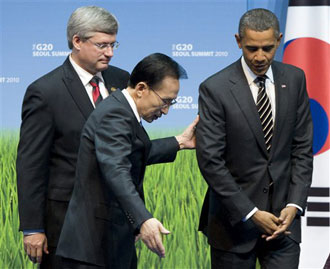The Seoul G20 summit was supposed to be a chance for South Korea to put on the dog, show that it belongs comfortably among the world’s rich and powerful nations. The only threat to that goal was deemed to be the specter of some deadly provocation by the North.
The North was nowhere in sight when a Korean navy ship accidentally collided with a bigger fishing boat and sank with the loss of two lives. The North couldn’t possibly be blamed for the Pohang nursing home fire that killed 10 or the crash of a spy plane during a training run that killed two pilots. This unusual spate of deadly mishaps may even have raised some serious doubts as to whether even the sinking of the Cheonan a few months ago had not been some homegrown mishap rather than a deliberate attack by the North.
These three ill-timed mishaps probably made Korea the butt of a few private jokes, but they don’t diminish its stature as an emerging top-10 power. But as with many mishaps perfectly timed to undercut some supposedly defining moment in the sun, they contain useful truths: Korea should recognize that the time has come to free itself from the folly of trying too hard to prove that it belongs in a club whose time is fading. Just let Korea’s amazing achievements speak for themselves. At least two of those fatal mishaps may have resulted from the mindless activity that comes of being too eager to impress.
The other major irony of the G20 is Barack Obama’s role as the leader presiding over U.S. decline relative to its trading partners. Obama’s 2008 triumph as the most popular president in a generation had already begun to recede into memory after the democrats’ recent midterm losses. But in the world at large Barack Obama remains a figure of eloquent hope among a crop of otherwise humdrum world leaders. The fact that he is an African American has something to do with it, embodying as he does the belief that the world’s most powerful nation is, at heart, a decent society built on the ideals of equality and human dignity.
Ironically, Obama came to Seoul with no real prospect of embodying the U.S. at its best. Instead he carried with him our national guilt at having authored the Great Recession with our greed and profligate ways. And he had to explain why the U.S. is printing 600 billion more bogus bucks while preaching the need to avoid a currency war. Under those circumstances, there was little chance he would find support for pressuring China to massively boost the yuan, especially at a time when China is the nation emerging as the world’s growth engine. Adding to the air of leading a declining giant, Obama couldn’t get the host nation — historically the most compliant of U.S. allies along with Japan — to let the U.S. renegotiate the bilateral free-trade agreement hammered out several years earlier.
These unfavorable outcome were foregone conclusions in the minds of most observers, as well as, probably, Obama himself. And, as Obama points out, he has used the summit to continue building close relationships with leaders like Singh, Kan, Lee and even Hu—relationships likely to become increasingly important as the new, post-recession world order falls into place.
But for now the world’s most popular U.S. president in a generation flies away from Seoul empty-handed to the delight of his domestic detractors. It’s the kind of undercutting outcome so often produced by high-profile moments. But these moments also suggest the more important, lasting reality of Barack Obama: a U.S. president the world trusts as a champion of balance and rationality. The sought outcomes would have been nominal wins that might have played well back home. But they would have been remembered by our trading partners in a very different light in years to come, long after the dust has settled on the frantic mandate to do something, anything, to flog U.S. exports.
Obama has come away from Seoul with something far more valuable and lasting: the trust and goodwill of world leaders who see him as a U.S. president who knows how to reason and cooperate rather than bully or bluster. That trust will be sorely needed when Obama begins the second, more important great mission of his presidency: poising the United States to remain the world’s leader in a new era in which it will no longer be the world’s biggest and richest market.

